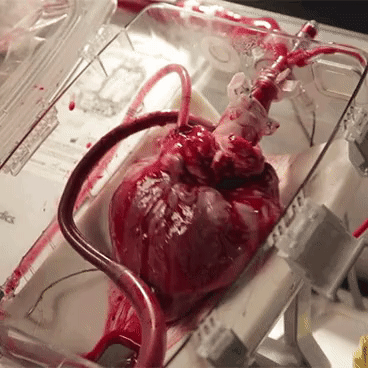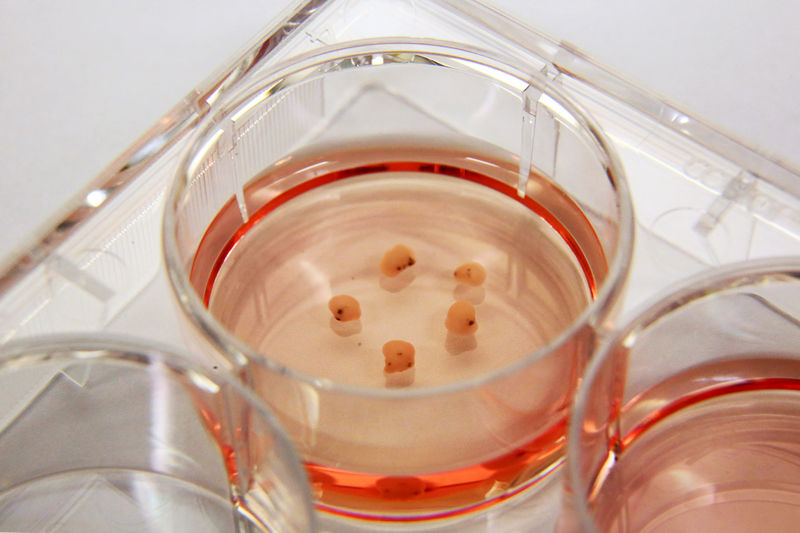 Pigs are traditionally used as models for transplantation.
Pigs are traditionally used as models for transplantation.The brain is able to live for a long time outside the body. This hypothesis was confirmed by an experiment conducted by a group of neuroscientists led by Nenad Sestan from Yale University.
The article has been filed for publication in a scientific journal and has not yet been reviewed. The authors have so far refrained from commenting, but on March 28, 2018 at a meeting of the National Institutes of Health on bioethics in neuroscience, they said that the results are “mind incomprehensible” and “unexpected,”
reports MIT Technology Review .
Doctors are already looking forward to exciting new opportunities that will open up for experiments on the living brain. After all, the arsenal of tools and substances that can be tested is significantly expanding. There are no problems with connecting electrodes to living tissues, with powering electronics for brain-computer interfaces. In general, quite staggering prospects. If experiments on the human brain will be resolved (formally, a dead brain is taken for the experiment, and then it is revived, which does not contradict the legislation), then medicine will soon have a lot of discoveries.
Nenad Sestan does not yet go into the details, but he still said something about the experiment. It is known that the experiment was performed on 100−200 pigs in the slaughterhouse. Four hours after decapitation, specialists restored blood circulation in the brain using a system of pumps, heaters, and bags of artificial blood heated to body temperature.
The researchers found that for a long time, "billions of individual cells in the brain remained healthy and capable of normal activity." True, no electrical activity was detected.
The BrainEx innovation system, which took four years to develop, restores the blood microcirculation even in the vessels that are deep in the brain. BrainEx perfusion fluid is capable of transporting oxygen along the brain stem and cerebellar artery deep into the center of the brain. Many chemicals have been added to the fluid to prevent swelling. Their side effect is suppression of neuron activity. This is another reason that can explain the lack of activity on the EEG.
Talk about this experiment at Yale University in scientific circles has been going since last spring, writes
MIT Technology Review . Scientists do not question the results.

In principle, why the brain does not preserve its functionality, because it is possible for many other organs that normally work outside the human body, like the heart. “If you managed to save cell life, then it’s a living organ,” says Steve Hyman, director of psychiatric research at the Brod Institute in Cambridge. “Here is an extreme degree of technical innovation, but the result is not much different from saving a kidney.”
The scientist warned that such experiments on organ preservation and transplantation should not be taken as a way to prolong life. It may come to the point that people will ask instead of freezing the brain to ask to take out their brain and find another body for it. At the moment, such hopes are inappropriate, explains the scientist. According to Hyman, a brain transplant in a new body is impossible.
Recall that a few months ago it became known about
successful experiments on the cultivation of chimeras - pig embryos with the beginnings of human organs. Using the CRISPR-Cas9 genetic editing technique and the latest stem cell processing technology, scientists successfully implanted stem cells into pig embryos, examining the development of human tissues and organs, the heart and liver.
 Human brain organoid grown in a stem cell test tube
Human brain organoid grown in a stem cell test tubeThe experiment raises questions among specialists in bioethics, as well as other similar experiments, which in the future may be related to experiments with the human brain,
writes Nature . The pig is very close to us in physiology. It is unknown if she was conscious during the experience when her brain was separated from the body. If so, what she experienced. How to approach such experiments in public in general, if we are not convinced of the humanity of experiments.
“Our animal did not feel anything. I am absolutely sure of that, ”says Sestan. “Hypothetically, someone can improve our technology and will be able to restore [brain] activity. This is the rebirth of man. If he still keeps his memory, then he will completely blow the roof off of me, ”said the scientist.
Science has yet to learn what a person will experience if he “wakes up” in conditions of absolute sensory deprivation, without organs of sight, hearing, touch, and without the ability to communicate except through a computer interface. Will he have memories of his former life, will his personality remain unchanged after separation from the body, and what legal rights will an isolated brain have?